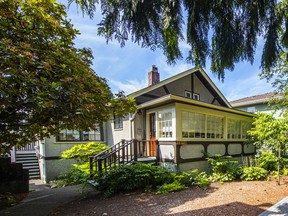After many years of support, the historic Joy Kogawa House is about to be designated as a heritage designation.

1450 A modest house on West 64th Avenue is the Vancouver City Council. July 12th for the heritage status designation to come before.
The 1912 bungalow had a gable roof, artisan-style bare rafters, siding spliced eaves, and siding siding hidden somewhere under the stucco. It is a feature.
These elements are reminiscent of the time and place of the city where Marpole's dwelling began to replace farmland, but the historical importance of the house goes beyond its structure. This is the house where the writer Joy Kogawa (then Joy Kogawa) lived with his parents and brother until the age of six.
In 1942, the Government of Canada confiscated a home under the War Measures Act. The families were forcibly taken away and imprisoned in Slokan's detention camp, where they were forced to work as sugar beet farmers.
In 1944, the house was auctioned by the government without the consent of the family. Ogawa's family was not allowed to return to BC. After World War II, she never lived in her house again because of the exclusion zone.
Ogawa is finally back with her famous 1981 novel "Aunt" set in her home. The novel raised her awareness of the deportation and imprisonment of nearly 22,000 Japanese Canadians.
The house had changed hands several times before it was purchased in 2003. At that time, the owner applied for a dismantling permit.
Ogawa visited his house in 2003 and was inspired by the knotty cherry trees that thrived in his backyard. In her Image Journal, Ogawa talks about touching her trunk: The suffering that has happened so far among us, in our family, in our community. All the suffering of people was completely known and we were completely loved.
After that encounter, she wrote a children's book, Naomi Tree, and a group oflocal and international writers protected the land in British Columbia. Lobbying activities in the ward. To preserve the house as a historically and literary important place. Funds have been raised to buy a home, and since then more than 50 writers have lived, holding regular community events focused on writing, healing and reconciliation, serving as an artist's hub. Has played.
Founder Anne-Marie Metten said: "It makes a lot of sense for writers to be here. We are a place for writers. That is, we need a retreat space for visiting writers, creating new work projects, and researching writing projects. Means a live workspace for local writers. "
Metten told the writer that the house" for the writing of social justice that Ogawa brought to the whole work. " He said he hopes to be able to provide "humility, inspiration."
Ogawa, who recently celebrated his 87th birthday, lives in Toronto, and the tree that caused great damage to her during the 2021 storm is new when she sees a broken limb. As she grows, her tufts of leaves appear in the trunk.
Metten said that the tree, like a house, is a symbol of bursting, resilience and healing.
"Writing plays an important role in healing trauma, which is represented in this place of memory. Joy Kogawa did not talk about a family camp with an aunt. Then the average Canadian wouldn't know the story of a Japanese Canadian camp, "Metten said.
Metten said that in addition to funding from the city, about $ 1.2 million was raised to continue the restoration of the home. Restoration work involves making it fully accessible and stripping the stucco to reveal the original cedar shingles.
dryan@postmedia.com

To receive daily headline news from Vancouver Sun Sign up for, a division of Postmedia Network Inc.
Thank you for registering.
A welcome email has been sent. If you don't see it, check your junk folder.
The next issue of Vancouver Sun Headline News will arrive in your inbox shortly.


